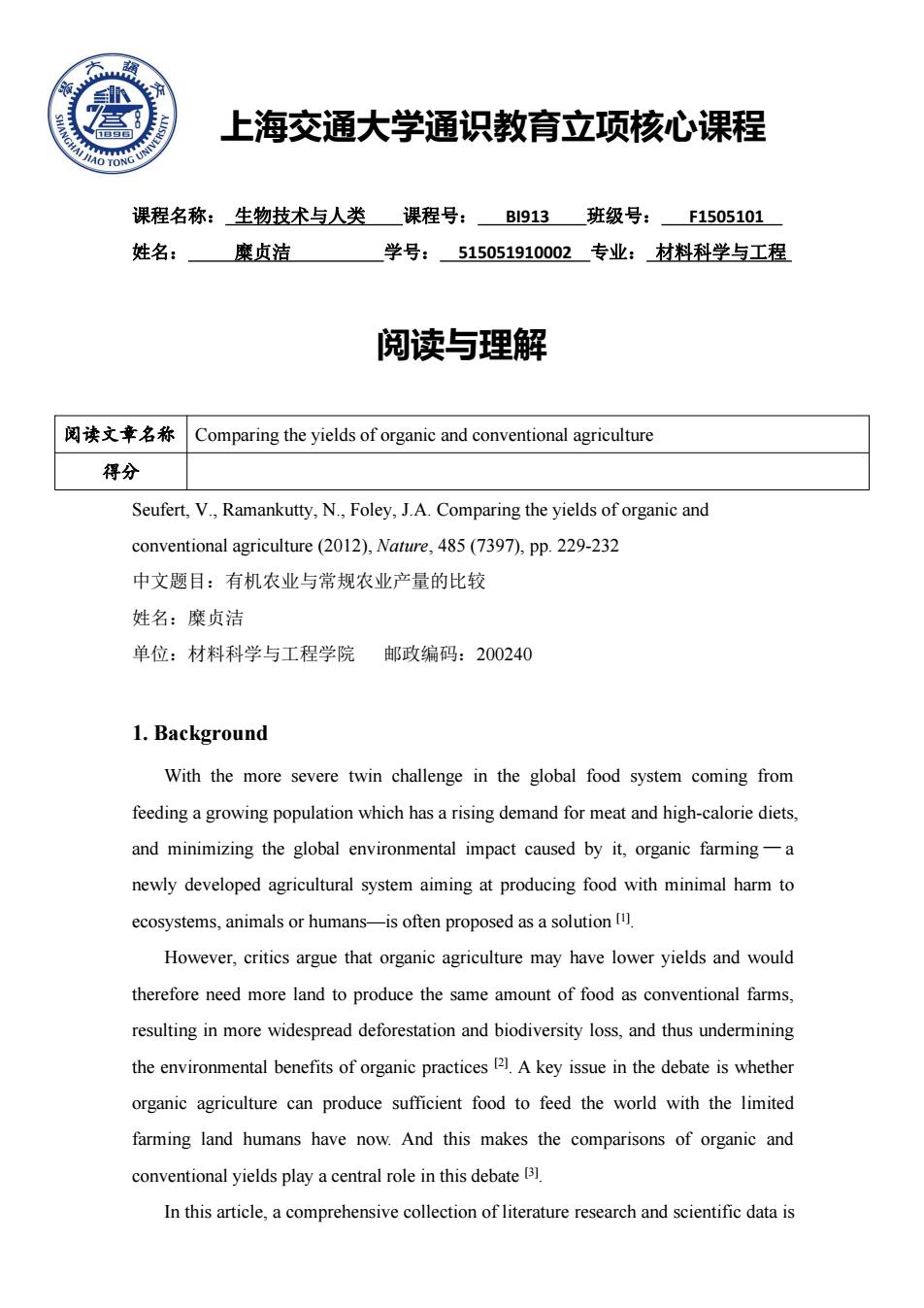
≤ 上海交通大学通识教育立项核心课程 课程名称:生物技术与人类 课程号: B1913班级号: F1505101 姓名: 糜贞洁 学号:515051910002专业:材料科学与工程 阅读与理解 阅读文章名称 Comparing the yields of organic and conventional agriculture 得分 Seufert,V.,Ramankutty,N.,Foley,J.A.Comparing the yields of organic and conventional agriculture (2012),Nature,485(7397),pp.229-232 中文题目:有机农业与常规农业产量的比较 姓名:糜贞洁 单位:材料科学与工程学院 邮政编码:200240 1.Background With the more severe twin challenge in the global food system coming from feeding a growing population which has a rising demand for meat and high-calorie diets, and minimizing the global environmental impact caused by it,organic farming-a newly developed agricultural system aiming at producing food with minimal harm to ecosystems,animals or humans-is often proposed as a solution [1l. However,critics argue that organic agriculture may have lower yields and would therefore need more land to produce the same amount of food as conventional farms, resulting in more widespread deforestation and biodiversity loss,and thus undermining the environmental benefits of organic practices 2.A key issue in the debate is whether organic agriculture can produce sufficient food to feed the world with the limited farming land humans have now.And this makes the comparisons of organic and conventional yields play a central role in this debate [31. In this article,a comprehensive collection of literature research and scientific data is
上海交通大学通识教育立项核心课程 课程名称: 生物技术与人类 课程号: BI913 班级号: F1505101 姓名: 糜贞洁 学号: 515051910002 专业: 材料科学与工程 阅读与理解 阅读文章名称 Comparing the yields of organic and conventional agriculture 得分 Seufert, V., Ramankutty, N., Foley, J.A. Comparing the yields of organic and conventional agriculture (2012), Nature, 485 (7397), pp. 229-232 中文题目:有机农业与常规农业产量的比较 姓名:糜贞洁 单位:材料科学与工程学院 邮政编码:200240 1. Background With the more severe twin challenge in the global food system coming from feeding a growing population which has a rising demand for meat and high-calorie diets, and minimizing the global environmental impact caused by it, organic farming — a newly developed agricultural system aiming at producing food with minimal harm to ecosystems, animals or humans—is often proposed as a solution [1]. However, critics argue that organic agriculture may have lower yields and would therefore need more land to produce the same amount of food as conventional farms, resulting in more widespread deforestation and biodiversity loss, and thus undermining the environmental benefits of organic practices [2]. A key issue in the debate is whether organic agriculture can produce sufficient food to feed the world with the limited farming land humans have now. And this makes the comparisons of organic and conventional yields play a central role in this debate [3]. In this article, a comprehensive collection of literature research and scientific data is
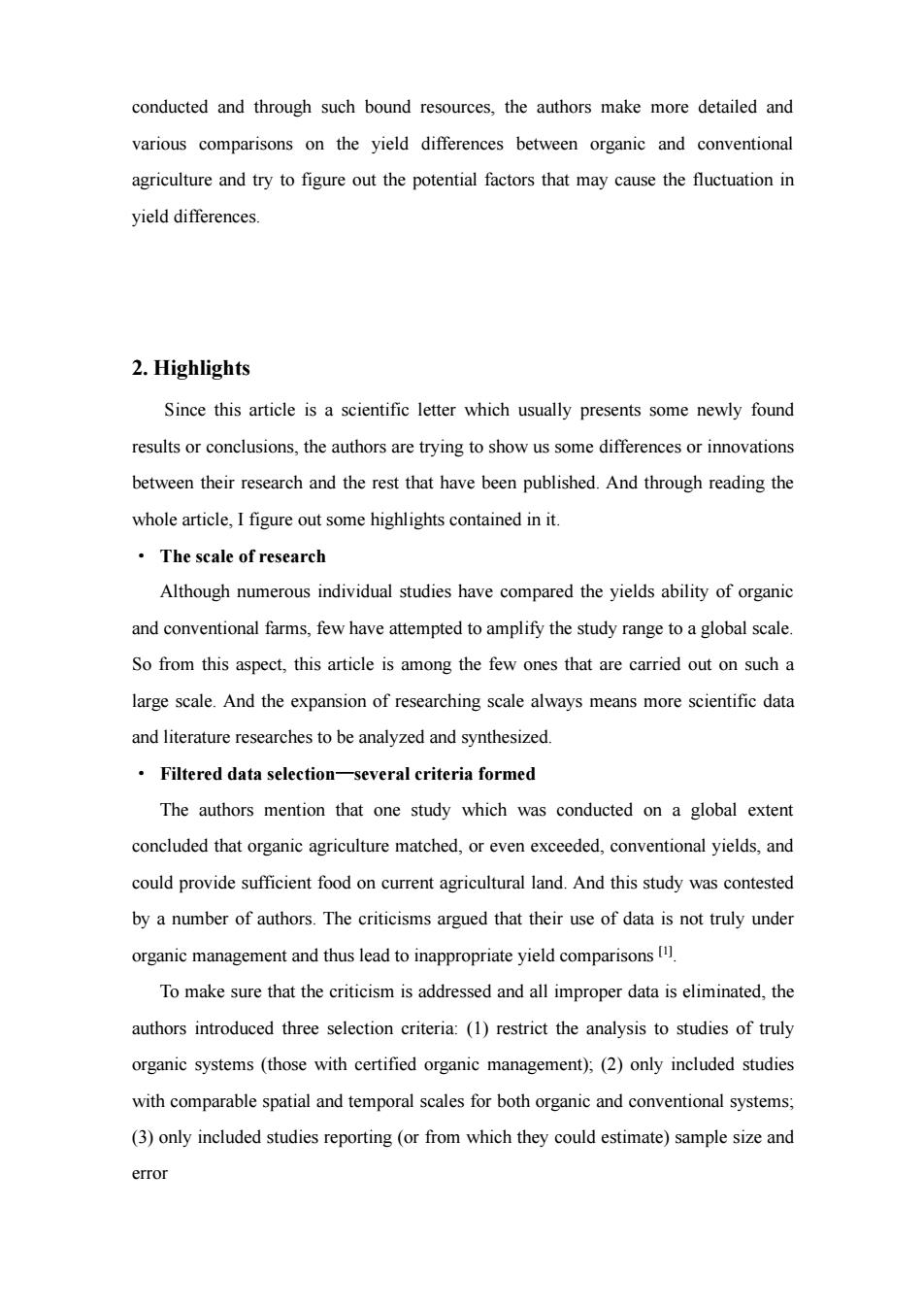
conducted and through such bound resources,the authors make more detailed and various comparisons on the yield differences between organic and conventional agriculture and try to figure out the potential factors that may cause the fluctuation in yield differences. 2.Highlights Since this article is a scientific letter which usually presents some newly found results or conclusions,the authors are trying to show us some differences or innovations between their research and the rest that have been published.And through reading the whole article,I figure out some highlights contained in it. ·The scale of research Although numerous individual studies have compared the yields ability of organic and conventional farms,few have attempted to amplify the study range to a global scale. So from this aspect,this article is among the few ones that are carried out on such a large scale.And the expansion of researching scale always means more scientific data and literature researches to be analyzed and synthesized. Filtered data selection-several criteria formed The authors mention that one study which was conducted on a global extent concluded that organic agriculture matched,or even exceeded,conventional yields,and could provide sufficient food on current agricultural land.And this study was contested by a number of authors.The criticisms argued that their use of data is not truly under organic management and thus lead to inappropriate yield comparisons To make sure that the criticism is addressed and all improper data is eliminated,the authors introduced three selection criteria:(1)restrict the analysis to studies of truly organic systems(those with certified organic management);(2)only included studies with comparable spatial and temporal scales for both organic and conventional systems; (3)only included studies reporting (or from which they could estimate)sample size and error
conducted and through such bound resources, the authors make more detailed and various comparisons on the yield differences between organic and conventional agriculture and try to figure out the potential factors that may cause the fluctuation in yield differences. 2. Highlights Since this article is a scientific letter which usually presents some newly found results or conclusions, the authors are trying to show us some differences or innovations between their research and the rest that have been published. And through reading the whole article, I figure out some highlights contained in it. · The scale of research Although numerous individual studies have compared the yields ability of organic and conventional farms, few have attempted to amplify the study range to a global scale. So from this aspect, this article is among the few ones that are carried out on such a large scale. And the expansion of researching scale always means more scientific data and literature researches to be analyzed and synthesized. · Filtered data selection—several criteria formed The authors mention that one study which was conducted on a global extent concluded that organic agriculture matched, or even exceeded, conventional yields, and could provide sufficient food on current agricultural land. And this study was contested by a number of authors. The criticisms argued that their use of data is not truly under organic management and thus lead to inappropriate yield comparisons [1]. To make sure that the criticism is addressed and all improper data is eliminated, the authors introduced three selection criteria: (1) restrict the analysis to studies of truly organic systems (those with certified organic management); (2) only included studies with comparable spatial and temporal scales for both organic and conventional systems; (3) only included studies reporting (or from which they could estimate) sample size and error
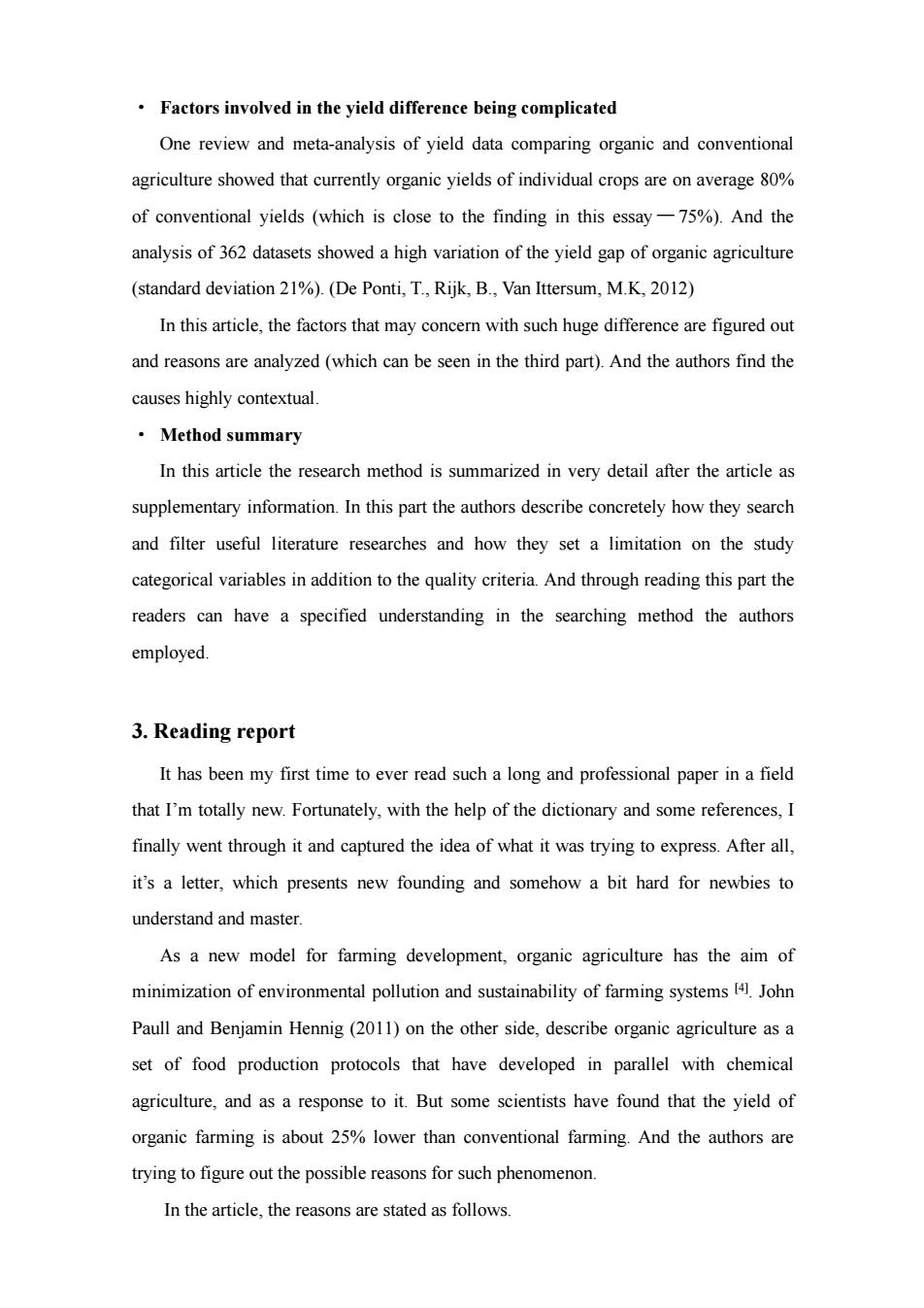
Factors involved in the yield difference being complicated One review and meta-analysis of yield data comparing organic and conventional agriculture showed that currently organic yields of individual crops are on average 80% of conventional yields (which is close to the finding in this essay-75%).And the analysis of 362 datasets showed a high variation of the yield gap of organic agriculture (standard deviation 21%).(De Ponti,T.,Rijk,B.,Van Ittersum,M.K,2012) In this article,the factors that may concern with such huge difference are figured out and reasons are analyzed(which can be seen in the third part).And the authors find the causes highly contextual. ·Method summary In this article the research method is summarized in very detail after the article as supplementary information.In this part the authors describe concretely how they search and filter useful literature researches and how they set a limitation on the study categorical variables in addition to the quality criteria.And through reading this part the readers can have a specified understanding in the searching method the authors employed. 3.Reading report It has been my first time to ever read such a long and professional paper in a field that I'm totally new.Fortunately,with the help of the dictionary and some references,I finally went through it and captured the idea of what it was trying to express.After all, it's a letter,which presents new founding and somehow a bit hard for newbies to understand and master. As a new model for farming development,organic agriculture has the aim of minimization of environmental pollution and sustainability of farming systems [41.John Paull and Benjamin Hennig (2011)on the other side,describe organic agriculture as a set of food production protocols that have developed in parallel with chemical agriculture,and as a response to it.But some scientists have found that the yield of organic farming is about 25%lower than conventional farming.And the authors are trying to figure out the possible reasons for such phenomenon In the article,the reasons are stated as follows
· Factors involved in the yield difference being complicated One review and meta-analysis of yield data comparing organic and conventional agriculture showed that currently organic yields of individual crops are on average 80% of conventional yields (which is close to the finding in this essay — 75%). And the analysis of 362 datasets showed a high variation of the yield gap of organic agriculture (standard deviation 21%). (De Ponti, T., Rijk, B., Van Ittersum, M.K, 2012) In this article, the factors that may concern with such huge difference are figured out and reasons are analyzed (which can be seen in the third part). And the authors find the causes highly contextual. · Method summary In this article the research method is summarized in very detail after the article as supplementary information. In this part the authors describe concretely how they search and filter useful literature researches and how they set a limitation on the study categorical variables in addition to the quality criteria. And through reading this part the readers can have a specified understanding in the searching method the authors employed. 3. Reading report It has been my first time to ever read such a long and professional paper in a field that I’m totally new. Fortunately, with the help of the dictionary and some references, I finally went through it and captured the idea of what it was trying to express. After all, it’s a letter, which presents new founding and somehow a bit hard for newbies to understand and master. As a new model for farming development, organic agriculture has the aim of minimization of environmental pollution and sustainability of farming systems [4]. John Paull and Benjamin Hennig (2011) on the other side, describe organic agriculture as a set of food production protocols that have developed in parallel with chemical agriculture, and as a response to it. But some scientists have found that the yield of organic farming is about 25% lower than conventional farming. And the authors are trying to figure out the possible reasons for such phenomenon. In the article, the reasons are stated as follows
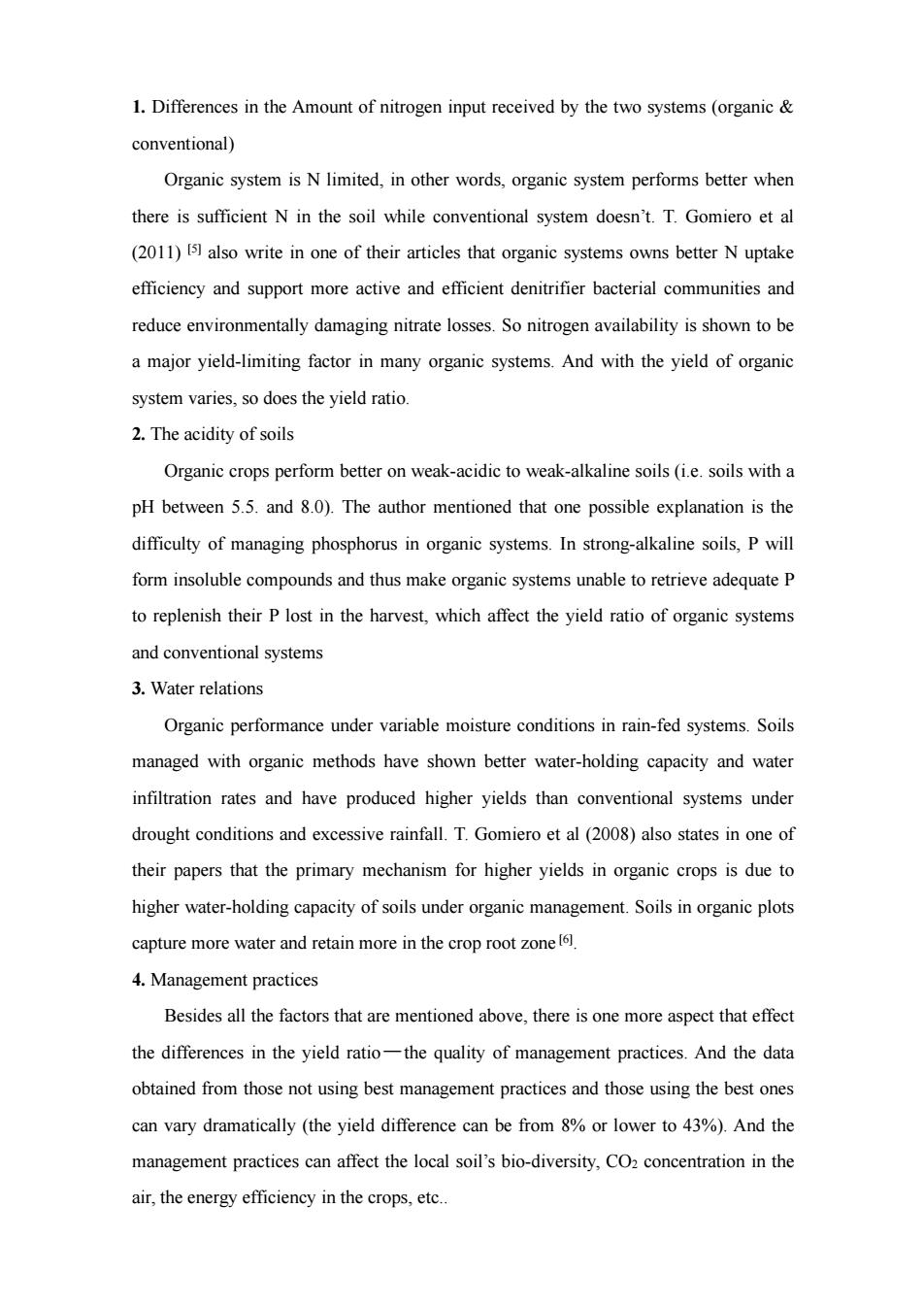
1.Differences in the Amount of nitrogen input received by the two systems(organic conventional) Organic system is N limited,in other words,organic system performs better when there is sufficient N in the soil while conventional system doesn't.T.Gomiero et al (2011)[5]also write in one of their articles that organic systems owns better N uptake efficiency and support more active and efficient denitrifier bacterial communities and reduce environmentally damaging nitrate losses.So nitrogen availability is shown to be a major yield-limiting factor in many organic systems.And with the yield of organic system varies,so does the yield ratio 2.The acidity of soils Organic crops perform better on weak-acidic to weak-alkaline soils(i.e.soils with a pH between 5.5.and 8.0).The author mentioned that one possible explanation is the difficulty of managing phosphorus in organic systems.In strong-alkaline soils,P will form insoluble compounds and thus make organic systems unable to retrieve adequate P to replenish their P lost in the harvest,which affect the yield ratio of organic systems and conventional systems 3.Water relations Organic performance under variable moisture conditions in rain-fed systems.Soils managed with organic methods have shown better water-holding capacity and water infiltration rates and have produced higher yields than conventional systems under drought conditions and excessive rainfall.T.Gomiero et al (2008)also states in one of their papers that the primary mechanism for higher yields in organic crops is due to higher water-holding capacity of soils under organic management.Soils in organic plots capture more water and retain more in the crop root zone (61. 4.Management practices Besides all the factors that are mentioned above,there is one more aspect that effect the differences in the yield ratio-the quality of management practices.And the data obtained from those not using best management practices and those using the best ones can vary dramatically (the yield difference can be from 8%or lower to 43%).And the management practices can affect the local soil's bio-diversity,CO2 concentration in the air,the energy efficiency in the crops,etc
1. Differences in the Amount of nitrogen input received by the two systems (organic & conventional) Organic system is N limited, in other words, organic system performs better when there is sufficient N in the soil while conventional system doesn’t. T. Gomiero et al (2011) [5] also write in one of their articles that organic systems owns better N uptake efficiency and support more active and efficient denitrifier bacterial communities and reduce environmentally damaging nitrate losses. So nitrogen availability is shown to be a major yield-limiting factor in many organic systems. And with the yield of organic system varies, so does the yield ratio. 2. The acidity of soils Organic crops perform better on weak-acidic to weak-alkaline soils (i.e. soils with a pH between 5.5. and 8.0). The author mentioned that one possible explanation is the difficulty of managing phosphorus in organic systems. In strong-alkaline soils, P will form insoluble compounds and thus make organic systems unable to retrieve adequate P to replenish their P lost in the harvest, which affect the yield ratio of organic systems and conventional systems 3. Water relations Organic performance under variable moisture conditions in rain-fed systems. Soils managed with organic methods have shown better water-holding capacity and water infiltration rates and have produced higher yields than conventional systems under drought conditions and excessive rainfall. T. Gomiero et al (2008) also states in one of their papers that the primary mechanism for higher yields in organic crops is due to higher water-holding capacity of soils under organic management. Soils in organic plots capture more water and retain more in the crop root zone [6]. 4. Management practices Besides all the factors that are mentioned above, there is one more aspect that effect the differences in the yield ratio—the quality of management practices. And the data obtained from those not using best management practices and those using the best ones can vary dramatically (the yield difference can be from 8% or lower to 43%). And the management practices can affect the local soil’s bio-diversity, CO2 concentration in the air, the energy efficiency in the crops, etc
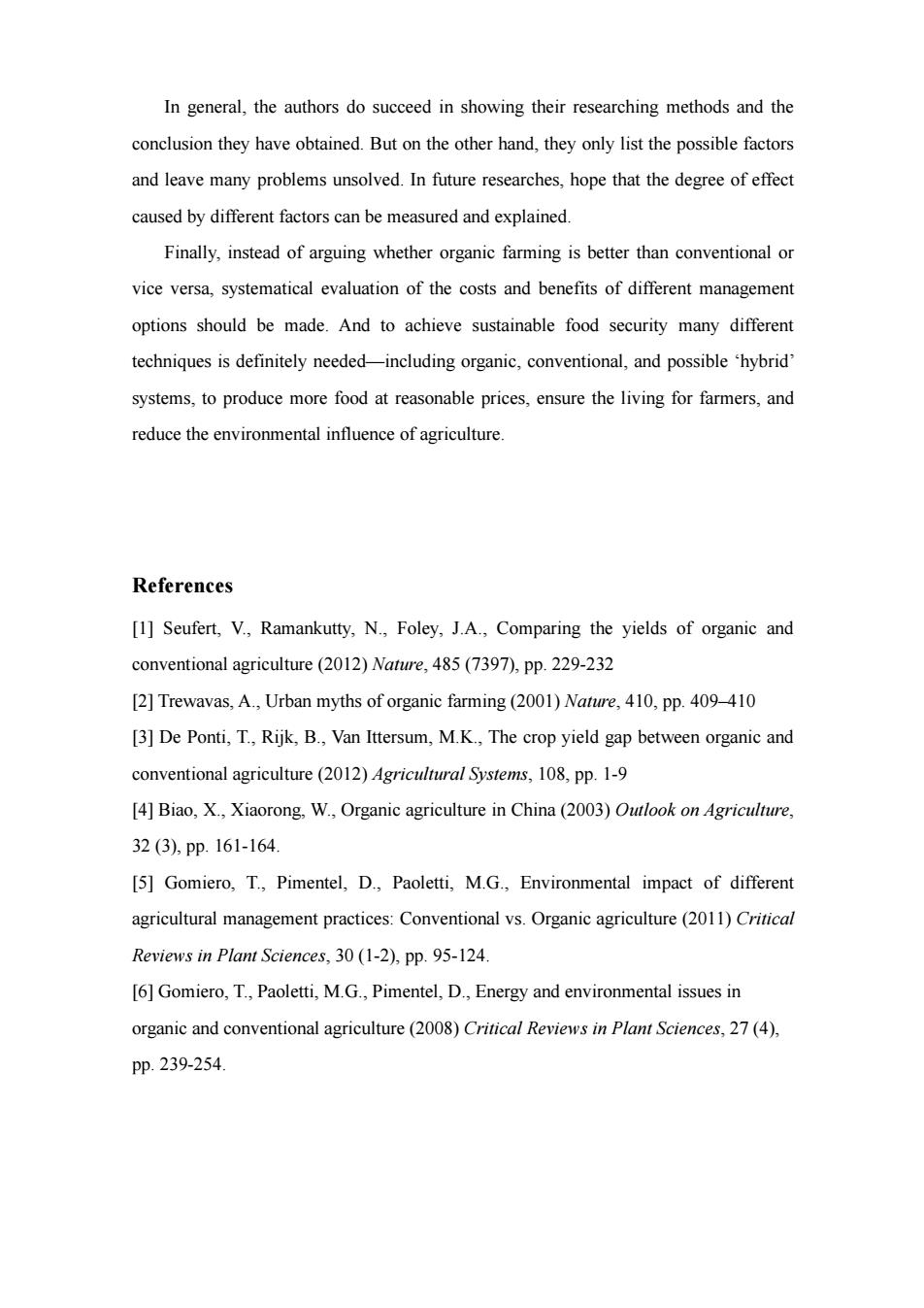
In general,the authors do succeed in showing their researching methods and the conclusion they have obtained.But on the other hand,they only list the possible factors and leave many problems unsolved.In future researches,hope that the degree of effect caused by different factors can be measured and explained. Finally,instead of arguing whether organic farming is better than conventional or vice versa,systematical evaluation of the costs and benefits of different management options should be made.And to achieve sustainable food security many different techniques is definitely needed-including organic,conventional,and possible hybrid' systems,to produce more food at reasonable prices,ensure the living for farmers,and reduce the environmental influence of agriculture. References [1]Seufert,V.,Ramankutty,N.,Foley,J.A.,Comparing the yields of organic and conventional agriculture(2012)Nature,485(7397),pp.229-232 [2]Trewavas,A.,Urban myths of organic farming (2001)Nature,410,pp.409-410 [3]De Ponti,T.,Rijk,B.,Van Ittersum,M.K.,The crop yield gap between organic and conventional agriculture (2012)Agricultural Systems,108,pp.1-9 [4]Biao,X.,Xiaorong,W.,Organic agriculture in China (2003)Outlook on Agriculture, 32(3),pp.161-164. [5]Gomiero,T.,Pimentel,D.,Paoletti,M.G.,Environmental impact of different agricultural management practices:Conventional vs.Organic agriculture (2011)Critical Reviews in Plant Sciences,30(1-2),pp.95-124. [6]Gomiero,T.,Paoletti,M.G.,Pimentel,D.,Energy and environmental issues in organic and conventional agriculture (2008)Critical Reviews in Plant Sciences,27(4), pp.239-254
In general, the authors do succeed in showing their researching methods and the conclusion they have obtained. But on the other hand, they only list the possible factors and leave many problems unsolved. In future researches, hope that the degree of effect caused by different factors can be measured and explained. Finally, instead of arguing whether organic farming is better than conventional or vice versa, systematical evaluation of the costs and benefits of different management options should be made. And to achieve sustainable food security many different techniques is definitely needed—including organic, conventional, and possible ‘hybrid’ systems, to produce more food at reasonable prices, ensure the living for farmers, and reduce the environmental influence of agriculture. References [1] Seufert, V., Ramankutty, N., Foley, J.A., Comparing the yields of organic and conventional agriculture (2012) Nature, 485 (7397), pp. 229-232 [2] Trewavas, A., Urban myths of organic farming (2001) Nature, 410, pp. 409–410 [3] De Ponti, T., Rijk, B., Van Ittersum, M.K., The crop yield gap between organic and conventional agriculture (2012) Agricultural Systems, 108, pp. 1-9 [4] Biao, X., Xiaorong, W., Organic agriculture in China (2003) Outlook on Agriculture, 32 (3), pp. 161-164. [5] Gomiero, T., Pimentel, D., Paoletti, M.G., Environmental impact of different agricultural management practices: Conventional vs. Organic agriculture (2011) Critical Reviews in Plant Sciences, 30 (1-2), pp. 95-124. [6] Gomiero, T., Paoletti, M.G., Pimentel, D., Energy and environmental issues in organic and conventional agriculture (2008) Critical Reviews in Plant Sciences, 27 (4), pp. 239-254